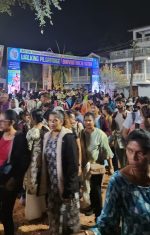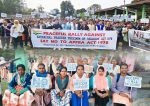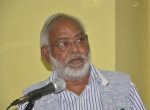By Hanson D’Souza
Sambalpur, October 11, 2019: After 11 years of anti-Christian persecution, Kandhamal violence survivors still experience trauma and the fear of impending further attacks said the latest research.
“The trauma and fear of the violence is still lurking around. The affected people of Kandhamal even today have the dreaded panic that there could be another attack to suppress them but they are mentally prepared if such a disaster is to happen again,” said Father Florence Ranasingh, principal of Khristo Jyoti Mohavidyaloyo (Light of Christ College), regional theology seminary, Sambalpur, Odisha, told at a seminar gathering.
These are the two main areas where the government and the Church need to concentrate to address problems at the grass-root level in Kandhamal, he said.
Father Ranasingh together with Father Ajay Sabhasundar, staff member, led a team for a field study which was undertaken by second-year students of theology from July 16-22 in Kandhamal.
The outcome of that study was presented at an annual research conference on “Theological response to Dalit Christian reality after Kandhamal violence” on October 7 – 8 at KJM.
The group used participatory observation and focused group discussion methods for its research.
A team of 18 theology students lived with the survivors during July 18-21. They split into groups of three and lived in the most affected villages— Nandagiri, Pirigoda, Mondakia and Gudriguda, besides Tiangia in Kandhamal.
The objective of the study was to learn about the present situation of the Dalit Christians who were affected by the anti-Christian violence and also reflect theologically on the same.
The 2008 violence in the Kandhamal was the biggest incident carried out on Christians in India in the name of religion.
Six researchers presented the findings on six aspects of the topic.
The first section was on Dalit Christians’ socio-cultural lives in Kandhamal district. Presenters emphasized on how Kandhamal Dalit Christians’ social life was before the violence, how it has affected them after the persecution and how it is today.
The second section was on the present economic situation of the Dalit Christians in Kandhamal. Speakers stressed how the Dalit Christians are coping with the situations they live in today. They reiterated that Dalit Christians deserve better pay hike and improved working conditions as many are working outside the district and the state.
Dalits of Kandhamal are concerned about the future of their children and are trying to provide them with the best they can afford. Many NGOs and Church organizations are working to improve the standard of the Dalit Christians, the study said.
The third section was on the “Politics and Government in the lives of Christian Dalits of Kandhamal.” This part dealt with the political awareness of the Dalit Christians, their presence in politics at various levels, political constraints, and the present situation of the Dalits, after 11 years of breakout of the violence.
The presenters gave a detailed facts and figures on how many were convicted and acquitted in legal court cases; how many houses were destroyed, how much compensation was given to the affected people, and the unjust cases where justice was and is denied by the government authorities.
Presenters emphasized that the Dalit Christians should be encouraged by the Church to participate in politics which is the best way to get their voices heard and also the government must take special care in bringing the Dalits into politics, said Bimal Digal, a presenter.
The fourth section dealt with religious practices, ecumenism, and feasts and festivals of Dalit Christians. Here the point for emphasis was how their practices changed with the emergence of new and stronger faith after the Kandhamal violence.
The fifth part was on the education and healthcare of the Dalit Christians. Facts and figures were given about how the standard of education, the quality of school building and the number of children to teacher ratio.
The sixth section was on researchers’ “Theological Reflections” of the field study. The presenters compared the sufferings, pain, and unjust treatment of the Dalits, to Jesus’.
After the presentation, researchers held a short action plan setting session as the translation of their presentation into action. They agreed that they need to do more to the people they wish to serve and bring up in life.
The college decided to keep the Dalits in their prayers and develop healthy attitudes Dalits and other marginalized communities, inviting the Dalits in and around them for spending a day together, said Binay Lakra, one of the presenters.
Violence against the Christians of Odisha erupted in Kandhamal with untold savagery, with Hindu right-wing groups blaming Christians for the August 23, 2008, murder of Hindu leader Swami Laxmanananda Saraswati, despite Maoist rebels claiming the assassination.
More than 100 people were killed and at least 64,000 displaced. More than 300 churches were destroyed in the district and 6,000 Christian houses were destroyed and rendered 56,000 homeless.
According to local sources, although over 3,300 complaints were made to the police, only 727 cases went to trial in fast-track courts, where more than 88 percent of the accused were acquitted.










